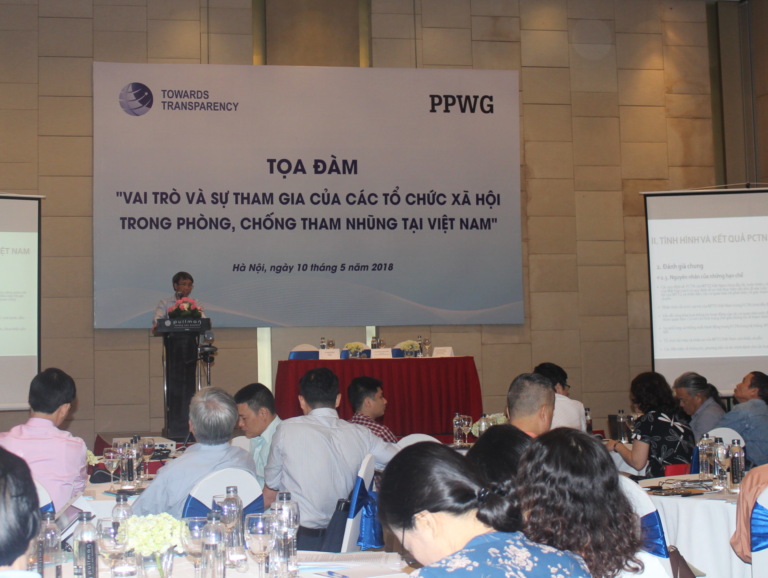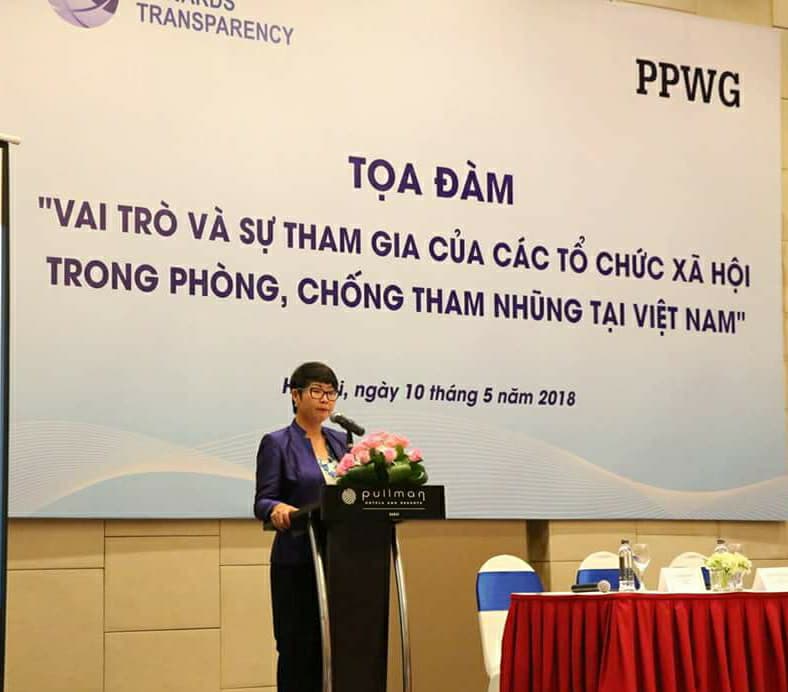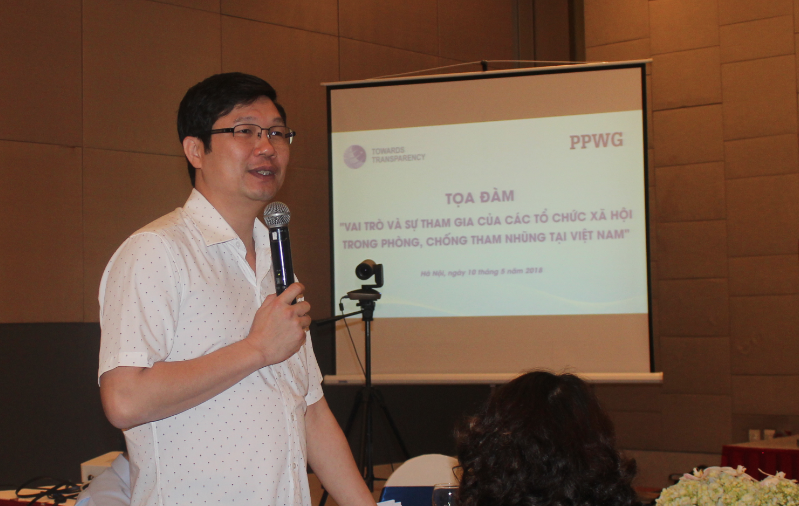Promotion of role and participation of social organizations in Anti-Corruption

Consultation Workshop with social organizations on the Draft Law on Anti-corruption
On May 10th in Hanoi, Towards Transparency (TT) – Transparency International (TI)’s National Contact in Vietnam, in cooperation with the People’s Participation Working Group (PPWG), successfully organized the workshop “Role and participation of social organizations in corruption prevention and fighting in Vietnam”. The event attracted over 70 participants from social organizations, governmental and media agencies as well as many independent experts and researchers. Participants discussed relevant legal provisions and provided inputs to improve the Draft Law on Anti-corruption which is currently being finalized by the Vietnamese Government and National Assembly’s Judicial Committee.
Ms. Nguyen Thi Kieu Vien – TT’s Executive Director gave an opening speech. She emphasized that Vietnam, as a signatory of the United Nations Convention against Corruption (UNCAC) from 2009, to some extent, did incorporate UNCAC’s Article 13 into the Vietnamese anti-corruption legislation.

“The Article 13 of the UNCAC requires its State Parties to promote and ensure the engagement of non-state actors in anti-corruption”, said Ms. Vien
Mr. Nguyen Tuan Khanh, Deputy Director of the Government Inspectorate (GI) Research Institute and member of GI’s drafting team, presented the standpoint of the Vietnamese Communist Party and of the State in encouraging society to take part in anti-corruption activities, especially in monitoring anti-corruption efforts. Citing the Draft, Mr. Khanh also highlighted the Anti-corruption responsibilities of the social organizations which are not funded by the state budget. Their responsibilities include, for instance: (1) implementing measures to detect and prevent corruption; (2) publicizing the contributions by members and funders; (3) handling acts of corruption in compliance with organizations’ charters or informing competent agencies with a view to settling cases showing signs of corruption crimes.

“According to Draft Law on Anti-corruption Law, social organizations which are not funded by State budget must publicize contributions by members and funders as well as the management and usage of these funds”, stated by Mr. Khanh
Mr. Nguyen Quang Minh, Head of Democracy and Law Department of the Vietnam Fatherland Front (VFF), shared with the participants VFF’s key achievements and efforts in mobilizing the participation of Vietnamese press and people in anti-corruption. Despite many positive results achieved, Mr. Minh stated that VFF must still overcome a number of challenges. To date, VFF and its members only play a reactive role of a “supporter” instead of an independent and influential player in anti-corruption.
From a legal perspective, Mr. Le Nguyen Duy Hau, Lawyer and TT’s expert, shared his legal analysis of the relevant provisions regulating the role and participation of social organizations not funded by state budget. Mr. Hau pointed out several limitations in this regard, in particular the fact that “social organizations” are not clearly defined in the Draft. This raises the important question of knowing which types of social organizations this law will govern. Moreover, the Draft places social organizations in a “passive” position by limiting their role to preventing and handling corruption within their own internal operation. If adopted, this provision will not reflect well the spirit of the UNCAC which engages the “active participation” of social organizations. It is also worrisome that social organizations, regardless of their size, are imposed with responsibilities such as “publicize the contributions that are donated by members, mobilized or sponsored funds and the management and usage of these funds” or “declare and control the assets, incomes of persons in power of charity organizations and social or charity funds”. If the Draft comes into effect, these requirements would be a real burden for social organizations, especially charity or small-sized organizations, while the feasibility of the law application is questionable. Furthermore, provisions on mechanisms to promote and support social organizations (for example: access to information, protection of social organizations being whistleblowers) are not specific enough.

Participants were discussing four issues regarding social organizations raised from the Draft. Most of opinions focused on the “limited” role and “burdensome” responsibilities which social organizations may have if this law comes into effect.
During the workshop, representatives of social organizations and experts constructively exchanged ideas with the member of GI’s drafting team as well as contributed practical recommendations for revising the Draft. Following the group discussion, the recommendations below will be compiled and sent to the Inter-ministerial Drafting Committee with the consent of the majority of participants:
(1) A clear definition of “social organization” should be supplemented.
(2) The role of social organizations in anti-corruption should be regulated to be more “active” and “broadened” in the Draft.
(3) Social organizations, especially those which act for community benefit or of small size, should be “encouraged” to apply measures to prevent corruption within their own internal operations and to publicize funds, or other measures regarding persons in power of charity organizations.
(4) Provisions on mechanisms to promote and support social organizations in anti-corruption should be specified in the Draft law.
To close the event, Mr. Le Quang Binh, President of People’s Participation Working Group (PPWG), summarized the key issues discussed. Mr. Binh further informed that the key recommendations made by the participants would be compiled and sent to the Inter-ministerial Drafting Committee and relevant agencies. All these inputs will help ensuring the compatibility of the Draft with UNCAC’s standards and well accounting for Vietnam’s local context.
For more details about the workshop, please contact Mr. Anh Do – TT’s Law and Advocacy Project Coordinator via email address: [email protected].